- Home
- Gustave Flaubert
Memoirs of a Madman and November Page 2
Memoirs of a Madman and November Read online
Page 2
This love is, in ‘November’, not only short-lived but one-dimensional. ‘Memoirs of a Madman’ had given us sacred love – modelled on the teenage Flaubert’s platonic and idealizing love for Elisa Foucault (there fictionalized as Maria). ‘November’ gives us its profane counterpart, also based on Flaubert’s own life – this time his first intense sexual experience, a brief holiday romance in Marseilles with Eulalie Foucaud de Langlade. (There is a nice similarity between the names, Elisa Foucault and Eulalie Foucaud, projected into the near-equivalence of their fictional counterparts Maria in the ‘Memoirs’ and Marie in ‘November’, as if sacred and profane loves could be melded together by fiat.) It seems that Eulalie, older and more experienced, took the initiative; it is certain that one of the things analysed most probingly (and effectively) in ‘November’ is masculine passivity. (And Sartre in turn devotes countless pages in his vast study of Flaubert, The Family Idiot, to Gustave’s own, very un-Sartrean, passivity.) The Narrator, before his encounter with Marie, wanders round the streets and country lanes dreaming as much of “being possessed” as of “possessing”; indeed, those quaint words seem even more inadequate than usual, as his pantheistic reveries are based on a longing for a kind of osmotic fusion in which the usual tiresome sexual roles, “active” and “passive”, can be safely ignored. It is no surprise to learn from his correspondence that the young Flaubert fantasized (in an overtly playful rather than anguished way, but intensely nonetheless) about self-castration, and dreamt (as does his Narrator) of becoming a woman. In ‘November’, the encounter with Marie leads to a sexual chiasmus: she seems the more masculine character, he the more feminine; she is active (almost predatory: she has become a prostitute because she likes sex, not – as is more usual – out of dire economic necessity), he is passive. He has a series of situations and moods; she has a story to tell, and despite the unlikely eloquence the text attributes to her, it is a strangely haunting one – more than just a premonition of Emma Bovary’s longings. The Narrator thus identifies Marie (rather glibly) as a soul sister: they meet at the crossroads of gender, as it were, and are both longing for something that sexuality at first seems to offer, but actually withholds. Sexuality, the secular form of transcendence, leads to a bad infinity (“More! More!”) – and thus ultimately fails to escape from the catalogue of things. She will always be looking for a real lover; he will search fruitlessly for an object (or activity) that will live up to his ideal. In their respective quests, they will exhaust the world’s resources, and for each other they will become merely rungs on a never-ending ladder to nowhere. No doubt Tracy too will become just one more of Isaac’s women, one more “love”. Perhaps neither the Maria of ‘Memoirs of a Madman’ (the permanent, paralysing spiritual ideal, perched conveniently on a pedestal) nor the Marie of ‘November’ (the all-too-available flesh) is really loved by their respective narrators (at least not in the unromantic sense that the latter actually have to live with them – always the supreme trial), and the dichotomy of Madonna and whore, although explored with great lucidity by Flaubert, is never resolved. It appears that Flaubert, who for all his perfectionism remained fond of this unpublished youthful piece, once promised to read ‘November’ to Baudelaire – who would have recognized this last topos with grim satisfaction.
‘November’ is already exploring one of its author’s most constant preoccupations – his sense that language gives us intelligibility but sacrifices the particular to do so. Flaubert, a literary prodigy who encountered life first through imagining it and writing about it, was prone to the nominalist temptation of thinking that, merely by labelling the items in the world (things in general), you can know it (in its particulars). The Narrator of ‘November’ likewise is very good at identifying the sorts of things in the world – he has read about them and spends hours re-imagining them. He knows the words “woman”, “mistress”, “adultery” before becoming personally acquainted with their referents. Words will open up his desire, but simultaneously make its satisfaction impossible. (Emma Bovary likewise dreams of finding a perfect instantiation of the words “happiness”, “passion” and “intoxication” – words that had seemed so alluring in books – and when she thinks she has found it, in Rodolphe, she is all too happy to identify this most intensely personal token with its type: having at last committed adultery she exults to herself, “I have a lover! A lover!”, i.e. “I am the sort of woman that has a lover!’) Language, which makes the world knowable, thereby, at least for Flaubert’s characters, makes any real experience of it secondary and belated. This again may well be a mistaken and simplistic view of language, but it gives Flaubert’s world its characteristic pathos. In that world, life is always struggling against its own clichés, and any apparent originality is soon revealed as a copy – just as the Narrator’s desire is at first, before its momentary crystallization in the shape of Marie, a desire for desire. He dreams (as she does) of the Orient, that place of exotic otherness par excellence, but what he peoples it with are sorts of things, stock situations, brightly coloured vignettes (what Rimbaud would ironically call ‘Illuminations’) – a melding of the stereotypes that can be picked and mixed from the sweet-shop of cultural references. At one moment, the Narrator calls a camel “the ship of the desert”: years later, in the Dictionary of Received Ideas that Flaubert probably intended to append to his last work, Bouvard and Pécuchet, we find (inevitably) “the camel is the ship of the desert” as an example of the mindless clichés that kept polite nineteenth-century conversation going. Already in ‘November’, it seems as if familiarity with the world conceals it from us. The Narrator realizes this with great lucidity. His identity is not essentially predicated (as is that of Isaac in Manhattan) on liking certain specific things: he is too vague for that, his personality as yet (and perhaps permanently) too indeterminate. He is the modern subject as undefined possibility, pure velleity: he would (in his imagination) like to be (or to have been) many things (an emperor, an eagle, a tyrant, an Indian perishing beneath the juggernaut, a woman, an African explorer, a starveling). Like Keats’s artist figure, he has negative capability – but he never converts that negativity into something more substantial by actually becoming an artist. Like many an adolescent male engorged by sexual desire, he suffers from an Ixion complex, seeking to embrace the clouds (Ixion lay with a cloud shaped like Hera, thinking that he was enjoying the favours of the goddess herself): but he carries that complex over into all desire, which, even when it is apparently satisfied by a perfectly fleshly human being, soon evaporates. An evanescence and indeterminacy of object usually seen as characterizing the merely transitional phase of adolescence comes, in Flaubert, to imbue all human relations: this may be because so many of his characters suffer from what the psychologists used to call, in their grim phraseology, “arrested development”, or it may be because the object of love is by definition indeterminate: a repetition and/or an anticipation of loves past or yet to come.
If ‘November’ shares these romantic themes with most of Flaubert’s other juvenilia, it shows a new and much more mature approach to style. ‘November’ moves from an “I” narrative to a “he” narrative, where an external narrator rounds off the Narrator’s tale for him, putting his mal-du-siècle posing into place in no uncertain terms: Anthony Burgess compared the effect to a cold shower coming after the overheated erotic adolescent effusions that have preceded it, and other critics have suggested that Flaubert – soon to suffer the strange fit of illness, epileptic in character, that meant he could “die” to the world, abandon his law studies and devote himself to writing – was killing off one aspect of himself, the solipsistic “I”, so as to rise anew as an objective, third-person artist. Be that as it may, ‘November’ is much better written than ‘Memoirs of a Madman’, which in other ways prefigures it. “Fragments in a Nondescript Style” reads the subtitle, with its fake modesty: the set-piece descriptions of climate and environment, and the almost hallucinatory exotic scenes dreamt up by the Narrator, already anticipa
te the mature novelist – though the Chateaubriand of the moody grandiloquence of René is also a strong influence. The young Flaubert seems at times to be practising his scales – a musical analogy which struck Sartre as particularly apt, given the euphoniousness of some of Flaubert’s prose poetry. Sartre goes so far as to devote several detailed pages to the passage where the Narrator imagines his death while rounding the Cape, or succumbing to cholera in Calcutta: not only is the alliteration notably contrived, but the vowel sequence (in French: “o-é-a-a-u-a”) reminds Sartre of a symphony in A major. (The reader of an English translation should bear in mind that A major sounds quite different in French and in English.)
Sartre, indeed, is still the best analyst of the way Flaubert’s whole career is implicit in his juvenilia. ‘November’ is still an effusive text, all sunsets and vague immensities: but there are signs of the scrupulous attention to concrete reality (the details of the furnishings of Marie’s room, for instance) that will mark the author of Madame Bovary. On the thematic level, Sartre brings out the ways in which Flaubert’s bad faith, multiple evasions and passivity were the products of a social totality that Flaubert himself could not fully grasp: but he also, with something like amorous fascination, shows how Flaubert, by recording this constellation of failings so pitilessly, is one of the most lucid analysts of the syndrome that has come to be known as bovarysme. If Flaubert (like the Narrator of ‘November’) is indeed too passive, too much of a bystander to achieve Sartrean existential autonomy and commitment, he nonetheless chooses an activity – writing – which is, as it were, the engagement of the disengaged, the vita activa of the contemplative. And the politically engaged Sartre is also alert to the way the disengaged Flaubert, who to a large extent shared with the Narrator of ‘November’ the temperament of a narcissistic dreamer, also went on to produce one of the most incisive political novels of the nineteenth (or indeed any other) century, Sentimental Education. Its protagonist Frédéric is, like the Narrator of ‘November’, another indecisive waverer, but he at least is forced to face a manifestation of political power at its most repressive as, in the 1851 coup d’état, the mounted dragoons of Louis Napoleon (soon to be enthroned as Emperor Napoleon III) come sweeping down the boulevards near the Paris Opéra while the crowd gazes on in mute terror. Frédéric does not understand this epiphany, perhaps, nor the magnificent (and / or stupid) sacrifice of his former friend the idealist Dussardier, who at least has found something to live and die for (he shouts “Vive la République!” and is cut down by Sénécal, another of Frédéric’s old friends, now a lackey of the new regime). This seizure of power by Louis Napoleon took place on 2nd December. Given the French predilection for labelling public upheavals by their months (the July Days of 1830, May ’68…), we can say that Flaubert as an artist at least made the (in its way revolutionary) transition from ‘November’ to December. The Frédéric of Sentimental Education is a character who does not just fade away, as the Narrator of ‘November’ seems to, from tædium vitæ, but has lived on – to encounter even graver challenges to male bourgeois solipsism and its romantic, world-weary posturing (or its suicidal depression). Which brings us back to Manhattan, for there is one item in Isaac’s list of things that make life worth living which I deliberately left out – but it’s there all the same, in between “Swedish movies” and “Marlon Brando”, as Isaac acknowledges a text and an author who had already so accurately diagnosed his modern anhedonia, but also the world of history and change lying just beyond its comprehension: “Sentimental Education, by Flaubert”.
– Andrew Brown
Memoirs of a Madman
At this time of year when we usually give and receive presents, we exchange gold and handshakes. But I am giving you my thoughts; a poor present! Accept them – they are yours, as is my heart.
– Gustave Flaubert, 4th January 1839.
To you my dear Alfred these pages are dedicated as a gift.
They contain an entire soul – is it mine, is it someone else’s? I had at first wished to write an intimate novel in which scepticism would be driven to the final limits of despair, but little by little as I wrote, my personal impressions peeped through the fable, my soul gripped my quill and flattened its tip.
So I prefer to leave it in the mystery of conjecture – you, I know, will conjecture nothing.
But you will perhaps think that the expression in several places is forced and the picture darkened just for the fun of it. Remember that it is a madman who wrote these pages, and if the words often seem in excess of the feelings they express it is because, in other places, they have sagged beneath the weight of emotion.
*
Farewell; think of me and for me.
1
WHY WRITE THESE PAGES? – What are they good for? – What do I myself know about it? It is foolish enough in my view to go round asking people the reason for their actions and the things they write. – Do you yourself know why you have opened the wretched pages that the hand of a madman is going to write?
A madman. That inspires horror. And what are you, reader? in which category do you place yourself, in that of fools or that of the mad? If you were given the choice, your vanity would still incline you to the latter condition. Yes, once again, what is it good for, I ask in all truth, a book that is neither instructive nor amusing, neither chemical nor philosophical nor agricultural nor elegiac, a book that gives no recipes for mutton or for getting rid of fleas, that talks neither of railways nor of the Stock Exchange nor of the intimate recesses of the human heart nor of medieval costume, neither of God nor of the devil, but which talks about a madman, by which I mean the world, that great idiot that has been rotating for so many centuries in space without moving forward a single step, and that howls and slobbers and tears itself apart.
I don’t know any more than you what you are about to read. For this is not a novel or a drama with a fixed plan, nor a single premeditated idea, with perfectly straight alleys staked out, down which your thoughts can meander.
But I am going to put down on paper everything that springs to mind, my ideas with my memories, my impressions my dreams my whims, everything which passes through my thoughts and my soul – laughter and tears, white and black, sobs that well up in the heart and are then rolled out like pastry in sonorous periods; – and tears diluted in romantic metaphors. And yet it oppresses me to think that I’ll be flattening the tips of a whole packet of pens, that I’ll be using up a bottle of ink, that I’ll be boring the reader and boring myself. I have become so accustomed to laughter and scepticism that the reader will find it’s one perpetual joke from beginning to end; and the merry folk who enjoy a good laugh will by the end be able to laugh at the author and at themselves.
You will see how necessary it is to believe in a plan governing the universe, in the moral duties of mankind, in virtue and in philanthropy – a word that I feel like writing on my boots, when I get some, so that everyone can read it and learn it by heart, even the most short-sighted of them, the smallest, creepiest and crawliest of creatures, those closest to the gutter.
It would be wrong to see in this anything other than the recreations of a madman. A madman!
And you, reader – perhaps you have just got married or paid off your debts?
2
SO I AM GOING TO WRITE the story of my life – what a life! But have I lived? I am young, my face is without a wrinkle – and my heart without passion. Oh! How calm life was, how mild and happy it appears, tranquil and pure! Oh yes, peaceful and silent like a tomb in which the soul is the corpse.
I have barely lived: I have not known the world – that is, I have no mistresses, no flatterers, no servants, no baggage – I have not, as they say, gone into society, as it has always appeared to me false and loud and wreathed in tinsel, boring and stuck up.
But life is not a series of deeds. My life is my thoughts.
So what is this thought that now leads me, at the age when everyone smiles and decides they are happy, when they get marrie
d, when they fall in love, at the age when so many others are intoxicated by all the love affairs and all the celebrity, when so many lights glitter and the glasses at the feast are full, to find myself solitary and naked, cold to all inspiration and all poetry, feeling that I’m dying and laughing cruelly at my prolonged death throes like that Epicurean who had his veins opened, bathed himself in perfume and died laughing like a man emerging drunk from an orgy that has worn him out.

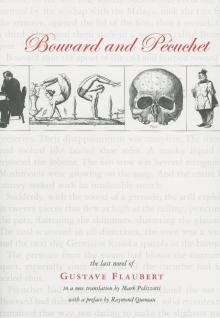 Bouvard and Pecuchet
Bouvard and Pecuchet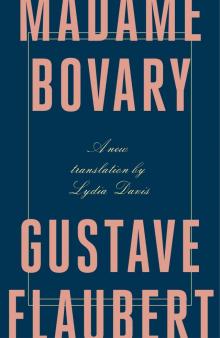 Madame Bovary
Madame Bovary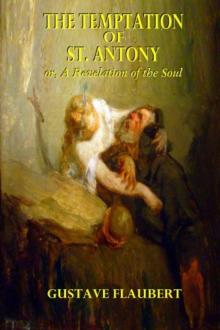 The Temptation of St. Antony
The Temptation of St. Antony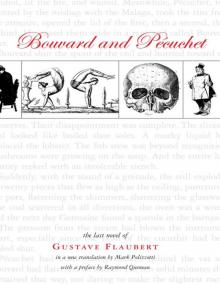 Bouvard and Pécuchet: A Tragi-comic Novel of Bourgeois Life, part 1
Bouvard and Pécuchet: A Tragi-comic Novel of Bourgeois Life, part 1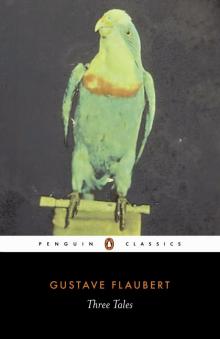 Three Tales
Three Tales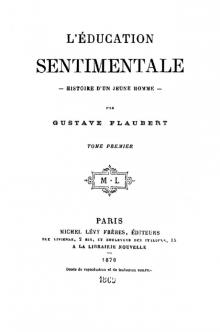 Education sentimentale. English
Education sentimentale. English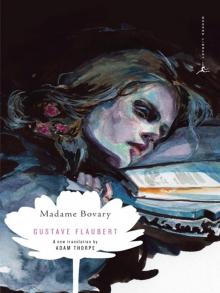 Madame Bovary (Modern Library)
Madame Bovary (Modern Library)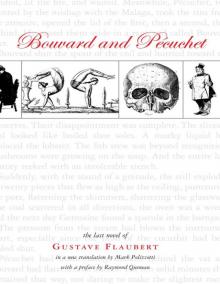 Bouvard and Pécuchet: A Tragi-comic Novel of Bourgeois Life, part 2
Bouvard and Pécuchet: A Tragi-comic Novel of Bourgeois Life, part 2 Sentimental Education; Or, The History of a Young Man. Volume 1
Sentimental Education; Or, The History of a Young Man. Volume 1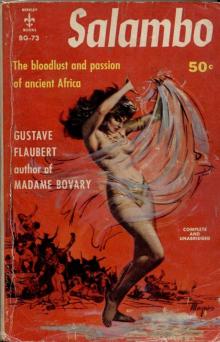 Salammbo
Salammbo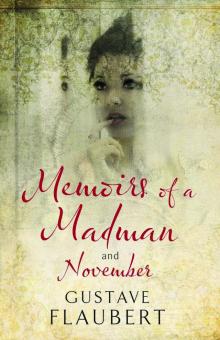 Memoirs of a Madman and November
Memoirs of a Madman and November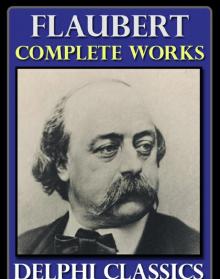 Complete Works of Gustave Flaubert
Complete Works of Gustave Flaubert